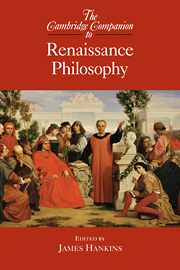Book contents
- Frontmatter
- 1 Introduction
- Part I Continuity and Revival
- 2 The philosopher and Renaissance culture
- 3 Humanism, scholasticism, and Renaissance philosophy
- 4 Continuity and change in the Aristotelian tradition
- 5 The revival of Platonic philosophy
- 6 The revival of Hellenistic philosophies
- 7 Arabic philosophy and Averroism
- 8 How to do magic, and why philosophical prescriptions
- Part II Toward Modern Philosophy
- Appendix: Brief biographies of Renaissance philosophers
- Bibliography
- Index
2 - The philosopher and Renaissance culture
from Part I - Continuity and Revival
Published online by Cambridge University Press: 28 November 2007
- Frontmatter
- 1 Introduction
- Part I Continuity and Revival
- 2 The philosopher and Renaissance culture
- 3 Humanism, scholasticism, and Renaissance philosophy
- 4 Continuity and change in the Aristotelian tradition
- 5 The revival of Platonic philosophy
- 6 The revival of Hellenistic philosophies
- 7 Arabic philosophy and Averroism
- 8 How to do magic, and why philosophical prescriptions
- Part II Toward Modern Philosophy
- Appendix: Brief biographies of Renaissance philosophers
- Bibliography
- Index
Summary
Philosophy as an academic discipline in schools and universities
During the Renaissance, the term philosophy could still denote learning in general: thus Gregor Reisch named his encylopedic textbook (published first in 1503 but reprinted extensively in northern Europe as well as in Italy throughout the sixteenth century) Margarita philosophica, a work which served as an introductory compendium of learning from the most elementary reading to theology, normally regarded as the pinnacle of knowledge. At the same time, however, Reisch focused on the subjects which had, in the course of the Middle Ages, come to constitute philosophy as an academic discipline: logic, natural philosophy (meaning natural sciences), morals, and metaphysics.
Up to the twelfth century, when Europe witnessed the emergence of specialized institutions of higher education - now known as universities but usually called studia or studia generalia in the later Middle Ages and the Renaissance - philosophy, as an academic discipline, regularly formed part of a unitary curriculum, beginning with elementary reading and grammar and terminating with theology, all of which was taught within one institution or school. Such schools usually had an ecclesiastical affiliation, often with a monastery or a cathedral. The best of these schools (e.g. at Chartres) embraced a remarkably catholic range of knowledge. William of Conches, for example, a great teacher who taught in the French schools during the first half of the twelfth century, left a series of commentaries reflecting his teaching activity: from grammar (on Priscian, in two different redactions) to moral philosophy, physics, cosmology, metaphysics, and theology (on Boethius’ Consolation of Philosophy, Macrobius, and Plato’s Timaeus).
- Type
- Chapter
- Information
- The Cambridge Companion to Renaissance Philosophy , pp. 13 - 29Publisher: Cambridge University PressPrint publication year: 2007
- 4
- Cited by



